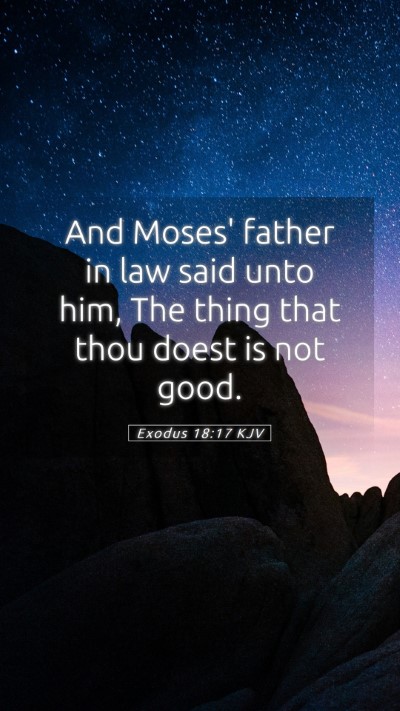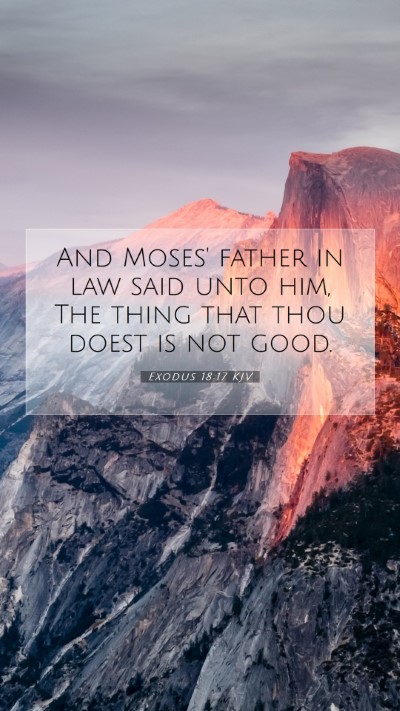Exodus 18:17 - Commentary and Interpretation
Exodus 18:17 states: "And Moses' father-in-law said unto him, The thing that thou doest is not good." This passage addresses the counsel of Jethro to Moses regarding the overwhelming burden of leadership and decision-making that Moses faced while leading the Israelites.
Summary of the Verse
This verse emphasizes the importance of wise counsel in leadership and the need for shared responsibilities in governance. Moses' approach, though dedicated and zealous, was not sustainable, and Jethro's advice highlights the necessity for delegation and the establishment of a judicial system.
Insights from Public Domain Commentaries
-
Matthew Henry:
Henry notes that Moses was working tirelessly but that one man could not bear the weight of leading a vast nation alone. His father-in-law's observation serves as a critical reminder of the dangers of isolation in leadership and the potential for burnout. Henry emphasizes that God's plans often include the wise counsel of others and that leadership should include a form of governance that distributes responsibility.
-
Albert Barnes:
Barnes elaborates on the notion that Jethro's intervention was timely and necessary. He points out the importance of Jethro's perspective as both an outsider and a wise man who understood the complexities of governance. Barnes argues that this moment signifies the transition from authoritative command to a more structured system of leadership that encourages participation and reduces strain on the leader.
-
Adam Clarke:
Clarke offers a deeper analysis of Jethro's role as a mentor to Moses. He illustrates the significance of this counsel not only in a practical sense but also as a demonstration of humility on Moses' part, recognizing the limits of his capacity. Clarke also highlights how this passage sets a precedent for effective leadership strategies that involve consulting and empowering others.
Application in Modern Context
The principles derived from Exodus 18:17 can be applied in various contexts today, especially in leadership roles within organizations, churches, and communities. The verse teaches the importance of delegation, teamwork, and seeking advice from experienced individuals, which remains relevant in all forms of governance.
Cross References
- Exodus 18:13-16: The preceding verses where Moses explains his role and the burdens he carries.
- Numbers 11:14-17: When Moses seeks help from the elders to share the burden of leadership.
- Proverbs 11:14: "Where no counsel is, the people fall: but in the multitude of counselors there is safety."
- Acts 6:1-4: The early church facing similar challenges of leadership and distributing duties.
- 1 Corinthians 12:12-27: Discusses the concept of the body of Christ working together with diverse functions.
Conclusion
In summary, Exodus 18:17 provides profound insights into the structure of leadership and community that are applicable even today. The verse encourages leaders to recognize their limits, seek counsel, and create inclusive systems of governance. Such principles align with biblical teachings on community, wisdom, and accountability, serving as a crucial reminder of the value of shared leadership.
Further Study
Readers interested in deeper insights should explore Bible study tools and resources that dissect biblical texts and their applications, as well as participate in Bible study groups focused on leadership lessons from Scripture. Understanding this passage within its historical context can significantly enhance comprehension and application in contemporary settings.


